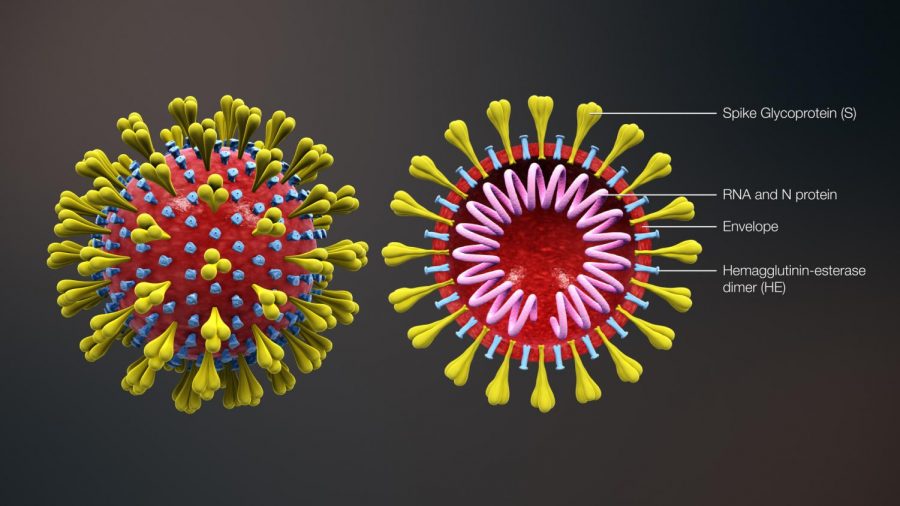Racism: Far More Devastating than Any Virus
March 9, 2020
When word spread about the coronavirus which ended the lives of well over 1000 people—and gave thousands more unbearable symptoms—in China, fear emerged almost instantaneously around the world.
According to the Centers for Disease Control and Prevention, “coronaviruses are common in many different species of animals, including camels and bats. Rarely, these coronaviruses can evolve and infect humans and then spread between humans.” The coronavirus that was detected in China is a new strain of the viruses that has not been detected in humans before, so researchers from the World Health Organization and other organizations are doing all that they can to learn more about the virus. The symptoms of this coronavirus mimic those of the cold or a flu. Fevers, coughing, shortness of breath, nausea, vomiting and diarrhea are all possibly symptoms. It can even lead to pneumonia, according to the New York Times. However, what makes the coronavirus scary is that these symptoms do not appear immediately after contraction of the disease. It can take anywhere from 2 to 14 days for symptoms to develop, say the Centers for Disease Control and Prevention. People with a history of other diseases, pregnant women, children and the elderly are at the highest risk. As of March, hundreds of thousands of cases have been reported worldwide, but the majority of them are not severe.
There are far more dangerous viruses and illnesses than corona—so why is the world acting like it’s the plague? The answer might just lie in racism and xenophobia.
Xenophobia is the fear of people from foreign countries. Many people have begun to show much anti-Chinese sentiment following the outbreak of the virus, avoiding China and the Chinese people in fear that they will contract the virus. In an interview with ABC 15 Arizona, Aretha Deng, a student of Chinese descent at Arizona State University, described a common situation she faces where she sits at a table and others get up and walk away from her. The Los Angeles Times reported that “false health information including warnings to avoid Asian food and Asian-populated areas has circulated, and videos of Asian people eating bats accompanied by inaccurate speculation about the cause of the virus and dehumanizing comments have gone viral. A barrage of vicious discussion and derogatory jokes about Chinese people or Asians in general have gathered steam online, drawing on age-old racist tropes associating Chinese people with disease, filth and dirty food, experts say.”
In some places, people have even displayed acts of verbal and physical abuse towards the Chinese. Ethnic slurs are being thrown left and right on Twitter. Andy Sue, the owner of a flower shop in Toronto, Canada, was left “shaken” when a stranger walked into his shop and started interrogating him as to whether or not he had been to Wuhan, the area in China where the virus originated, and then went off on a xenophobic rant to his face. “She said what she had to say and then she just walked out.” Doctors at a hospital in Sydney, Australia refused to even operate on one Chinese man because they feared he’d spread the coronavirus to them.
Some people who aren’t even Chinese have fallen victim to this abuse. At Brooke House College in Market Harborough, located in the UK, two Asian students of unreported non-Chinese ethnicities had eggs thrown at them simply because they looked Chinese. One student at a college in California who is of Vietnamese descent, Rosen Huynh, experienced emotional discomfort from this racism. “I don’t know if it’s just people looking at me coughing or because I’m an Asian person coughing, they think I might have the coronavirus,” said Huynh, in an interview with the Los Angeles Times. “I feel like every time I cough, people are going to be uncomfortable with that. I shouldn’t have to feel that way.” A boy from her school posted the statement “Taking Calc 151 with only Asians in the classroom … I hope I don’t catch coronavirus … thinkin [sic] about dropping this class now” to his Snapchat story.
It is clear that this racism is far more dangerous to both Asians and non-Asians alike than any virus. This anti-Asian racism is threatening the senses of security and mental health that they have.
“We’re expecting this type of thing to happen. We know that people will look at our black hair and ‘yellow’ skin and target us,” said Chinese entrepreneur Erin Wen Ai Chew in an interview with The Verge, describing her experience at an Australian airport in which a white woman ran away from her and other Asians at the airport with a shocked look on her face whenever she heard them cough. “There’s a lot of anger, a lot of resentment, and also a lot of dread to know that when we go out, we could be subject to racism.”
“Treat people who exhibit symptoms rather than targeting people for quarantine or barring them from public places simply because of the way that they look,” said University of Minnesota professor Erika Lee in an interview with the Los Angeles Times. “It’s really about using common sense and not letting fear and panic drive us to revert back to more base fear of foreigners.”












